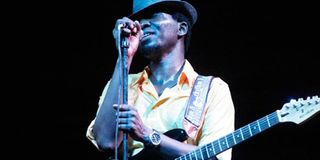Kaz Kasozi’s testimonial album

Star Shift: This recent music album by Kaz Kasozi explores some of the experiences he has been through over a couple of years.
What you need to know:
In putting together the songs, he would write lyrics at different times and in different mindsets
Singer Kaz Kasozi normally tries out new material in live shows as he develops his musical concepts. At the time he started working towards compiling his latest album titled Star Shift, he had written six songs and was performing them during his shows dubbed The Kaz Kasozi 7Project in 2014.
The actual recording started in May 2014. Eventually, he decided to work on 13 songs for the album which is his sixth. These were chosen out of 17 recorded and 22 written. Some didn’t come across well. He chose those that stood out. The songs in his Star Shift album, express elements around the themes of spiritual change and validation of life. Soulful best describes them as they conjure images of soul redemption for a listener. However, he is careful not to make the lyricism confused for gospel music.
He explains that as one gets older, experiences change one’s perspective on life. This album expresses some of those changes in him thus the musical content tells of relatable experiences.
The songs
Calling is one such song, tribute to his fallen mother, who he was so close to. He relays an inner voice like angels advising him, just as his mother used to. His soul goes crying again, in Justify, in which he prayerfully seeks direction in life. His spirit goes on in Tafadhali, in which he further seeks the grace of God.
Kasozi shifts to the subject of love in a track titled Boss Lady, a strong woman he is in love with, perhaps hypothetically. If it is not assumed then the woman’s love is as intoxicating as a good coffee, this you will attest in Coffee at Last.
In Eyalama, he sends his musical notes of gratitude to someone for painfully revealing a truth and weakness just in time for it to be corrected. He seeks a sign from a lover to know that they are the right person in Nipe Ishara.
The breakdance aficionado almost renditions Michael Jackson’s Billy Jean in Olubuto Lwa Nalumansi, denying a relationship after a girl wrongfully claims that he is the father of her child.
He deals with the subject of modern feminism that seems to frown upon the idea of being male in I am a Man.
The making of the album
The motivation behind the songs are experiences he went through since 2013. Some of these spiralled a bit out of his control, so the album is about his rise from those failures.
Besides losing his mother, he also lost two and had to start over from scratch. While walking through the downside of life, he turned to prayer and support of a few friends and family who stood by him and encouraged him to get his life back together.
In putting together the songs, he would write lyrics at different times and in different mindsets. He would pull out his pen and paper and write a song while travelling or when in a new environment, especially with nature and water. He worked with Timothy Nabulwa on the trumpet, Sharon Asinde and Toni Jay on backing vocals. He also had the help of producer Jason Kiwah of 3-in-One studios who advised through the project. Kasozi did all other instruments; bass, electric and acoustic guitars, congas, piano, synthesisers, drums, various percussion, flute and alto saxophone.
The man
Kasozi is a multi - instrumentalist who enjoys making music in organic ways with a very old school artistic approach. He plays the bass guitar best because he enjoys plucking it. In his music, you will hear inspiration of 1960s Rhythm and Blues flavour whilst some tunes bear fusions from the 1970s and ‘80s. “I like old school because it was the music my mum had around the house as we grew up, but also that which I listened to in my teens. From old Congolese hits, country-Western, Motown, Fela Kuti, James Brown and Prince,” he recounts, affording himself a smile. An exciting performer, on stage Kasozi will engage fellow instrumentalists in some sort of connection, improvising and having fun while at it, leaving something for the listener or audience to ponder or muse about.
Early beginnings
Kasozi was first exposed to music at seven, in primary school where he got a chance to play adungu- a stringed musical instrument of the Alur people of north-western Uganda, akogo- wooden sound box and later madinda- xylophone.
At 10, he joined a local church choir as a young vocalist. The musician in him started manifesting when he started realising he understood music and people began commenting about his dancing moves. “One of my uncles said music amuli mu musuwa (music runs in his veins). That made me aware of my ability to interpret music. I also realised that I could remember music with great detail much better than other things. With dance, I was good at traditional dances and breakdance,” he recalls. A fan of classic films, The Good, The Bad & The Ugly being his favourite, Kasozi learnt how to make sounds that create emotions like their sound tracks. Also seeing and hearing traditional musicians playing helped him realise the conversation of instruments.
The albums
Kasozi has five solo albums, namely Revolve, The Quest, Naked and Blue, Dance with Me and Postcard from Uganda. Star Shift is the sixth solo project. He also has five collaboration albums; Opiate Rhythms, Ear of the Elephant, Petals of Passion, Tears of the Dragon all four done at Fusion Factory and Jazzmoss which was done with Louisa Le Marchand.
All the albums have been released in Europe and on-line except Dance With Me that was released in Uganda.




